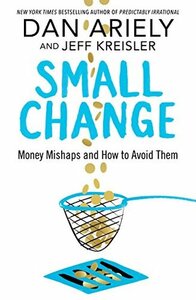Take a photo of a barcode or cover
informative
inspiring
medium-paced
Dla zaznajomionych z tematem książka będzie się wydawała przedszkolną lekturą. Humor natomiast jest raczej festiwalem niezadowolenia mężczyzny w kryzysie wieku średniego. Generalnie podstawy wiedzy i sarkazmu w nie śmiesznym wydaniu.
funny
informative
lighthearted
I enjoyed this- it had a lot of great insights and I’m definitely guilty of thinking about money in not the most helpful ways. So it helps shift how you should think about money. However- it’s very philosophical rather than practical- I’m not walking away with a ton of real life applications- I’m walking away with some ideas of how to and how not to value money.
Lesson #1 People are not logical with money
There is no Lesson #2
I saved you 300 pages, you’re welcome
There is no Lesson #2
I saved you 300 pages, you’re welcome
informative
medium-paced
Well structured and full of interesting insights, made me want to read more books about behavioural economics.
Reading this book ruined my marriage.
Well, not really, but it did lead my wife and I into a lukewarm debate about the word “artisanal” in the context of sharp white cheddar. I disagreed with her (and Ariely/Kreisler) and said that the artisanal definitely tasted different than the block extra sharp white cheddar. Naturally, the only way to resolve this is with a blind taste test. Ironically, we could both tell the difference between the cheeses but she persisted in her belief in the superiority of the block version. There’s no accounting for taste I guess. I mean, she married me right?
The essence of Dollars and Sense is that we are really bad at valuation. I mean really bad. The first thing we do is look for a point of comparison, usually the easiest one we can find: price. Sometimes we look for a similar item or a past purchase or even the previous price for the exact item we’re looking at. The more options in the mix, the worse we are at it. We overvalue things that don’t matter and entire industries have been invented to take advantage of our shortcomings.
Ariely and Kreisler want us all to evaluate our major purchases in terms of what we give up to obtain it (opportunity cost). But let’s flip this on its head: what would happen to the economy if everybody just started saving responsibly?
Didn’t think about that, did you guys? So much of our economy is smoke and mirrors, a house of cards. However you look at it. We need jobs to make money to spend on stuff that other people made that will break so that we have to work more hours to buy another one that will become obsolete in two years so that we again have to charge another one to our credit card.
And on and on and on.
Just like the market needs both hedgers and betters, the economy needs both savers and spenders. The main difference between the two is that the spenders have a lot of fun when they are young but have to work into their 80’s whereas the savers will get to have more fun in their golden years.
That’s about all I have for this book at the moment. I am off to see my if wife is influenced more by wine in a plastic cup or in a crystal goblet.
Well, not really, but it did lead my wife and I into a lukewarm debate about the word “artisanal” in the context of sharp white cheddar. I disagreed with her (and Ariely/Kreisler) and said that the artisanal definitely tasted different than the block extra sharp white cheddar. Naturally, the only way to resolve this is with a blind taste test. Ironically, we could both tell the difference between the cheeses but she persisted in her belief in the superiority of the block version. There’s no accounting for taste I guess. I mean, she married me right?
The essence of Dollars and Sense is that we are really bad at valuation. I mean really bad. The first thing we do is look for a point of comparison, usually the easiest one we can find: price. Sometimes we look for a similar item or a past purchase or even the previous price for the exact item we’re looking at. The more options in the mix, the worse we are at it. We overvalue things that don’t matter and entire industries have been invented to take advantage of our shortcomings.
Ariely and Kreisler want us all to evaluate our major purchases in terms of what we give up to obtain it (opportunity cost). But let’s flip this on its head: what would happen to the economy if everybody just started saving responsibly?
Didn’t think about that, did you guys? So much of our economy is smoke and mirrors, a house of cards. However you look at it. We need jobs to make money to spend on stuff that other people made that will break so that we have to work more hours to buy another one that will become obsolete in two years so that we again have to charge another one to our credit card.
And on and on and on.
Just like the market needs both hedgers and betters, the economy needs both savers and spenders. The main difference between the two is that the spenders have a lot of fun when they are young but have to work into their 80’s whereas the savers will get to have more fun in their golden years.
That’s about all I have for this book at the moment. I am off to see my if wife is influenced more by wine in a plastic cup or in a crystal goblet.
The book should be called: Predictably Irrational - Now, Only Curious Tales about Money.
I believe there must be nice and useful nuggets but, unfortunately, it’s tough to find those among the vast amount of lousy jones.
I believe there must be nice and useful nuggets but, unfortunately, it’s tough to find those among the vast amount of lousy jones.
funny
informative
medium-paced
Light-hearted look at our blind spots around money. Final chapter has a few suggestions for working around our bad habits. Nothing earth-shaking but it's a pleasant enough read, with a few observations that will make you wince about your past (or current) decisions.




